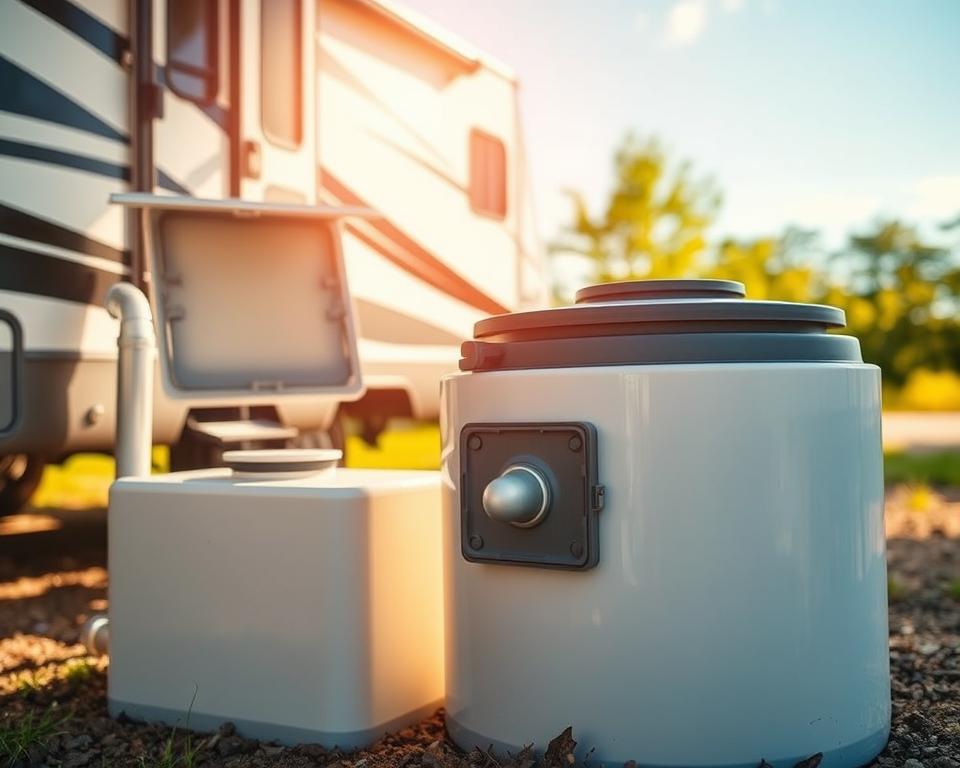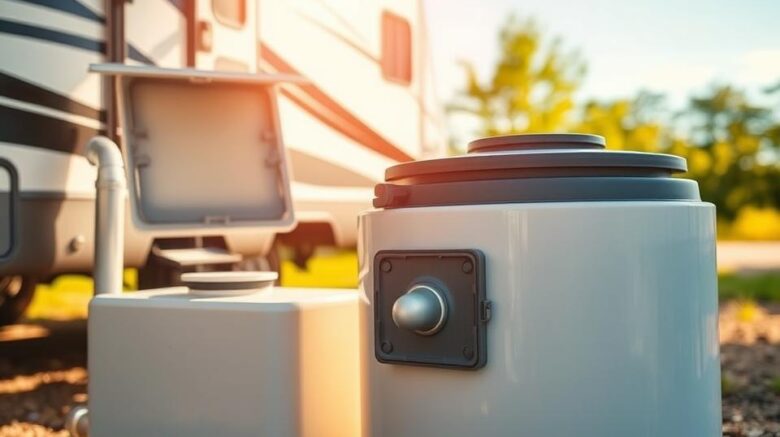Motorhome Septic Pumping: Your Manual to Hassle-Free Disposal
Have you ever pondered how your motorhome processes waste while enjoying the wilderness? RV septic pumping is crucial, often more than you think. It’s vital to have your motorhome’s waste system working well for trouble-free trips. This guide explains RV waste systems, the need for septic pumping, and top tips for stress-free excursions. With All in Sanitation’s expertise in RV septic pumping near me, your trips can be as splendid as your destinations.
Important Notes
- Knowing your RV’s waste system matters greatly for effective septic service.
- Frequent pumping stops unwanted odors and clogs while traveling.
- Following tips prolongs your motorhome’s pipework lifespan.
- All in Sanitation provides reliable recreational vehicle septic services.
- Timing your pumping prevents headaches at campsites.
- Eco-friendly dumping practices reflect good RV stewardship.
Getting to Know RV Sanitation Systems
RV waste systems are essential for efficient waste management on the road. These systems typically comprise black and gray water storage. The black tanks collect toilet waste. Meanwhile, gray tanks deal with wastewater from sinks and showers. Knowing their operations improves waste management in your RV.
It’s critical to maintain these systems properly. Neglecting scheduled emptying may result in blockages. This could spoil your camping trips. Ensure regular checks to keep both tank types functioning well.
Relying on a reputable black water provider ensures correct dumping. Also, treatments tailored for RV systems can prolong tank life and avert bad smells. Proper care of your waste system boosts your RV experience significantly.
The Importance of RV Tank Emptying
Routine septic service ensures a clean and efficient RV. Ignoring tank emptying can cause odors, clogging, and costly repairs. Waste buildup is a health hazard due to bacteria and contamination. Thus, ongoing upkeep is indispensable.
Choosing All in Sanitation guarantees green, compliant dumping. They handle your sewage with care and precision. Regular septic system care prolongs your travel joys without waste concerns. This practice preserves your adventures by sidestepping septic pitfalls.
When to Empty Your RV Tanks
How often you empty tanks influences your RV’s sanitation. It ensures your journey remains uninterrupted. Your pumping schedule depends on occupancy, tank capacity, and usage patterns.
For occasional RV users, it’s best to pump the black water tank every 3-5 days. Full-time campers often require more frequent dumping. Monitoring tank levels closely can improve your maintenance routine significantly.
Chemical treatments are useful for determining when to pump. By adhering to these disposal recommendations, RV owners can effectively safeguard their systems. Preventing tanks from overflowing not only keeps your environment clean but also prolongs the plumbing lifespan of your RV.

Methods for RV Septic Pumping
RV owners have multiple dumping methods at their disposal. Maceration uses a pump to liquefy solids creating a slurry for easier disposal. This facilitates easier disposal at dumping stations or designated areas. Many choose it for its speed and simplicity.
Home septic dumping allows for emptying the RV’s holding tank directly into a residential septic system. Check local rules to ensure lawful dumping. Properly executed, it’s eco-friendly and compliant.
Gravity dumping uses gravitational force to release waste into a cleanout port, being the most straightforward method. All dumping options have advantages and drawbacks. Knowing the differences helps you pick the right approach for clean and efficient disposal.
RV Waste Disposal Tools
Proper equipment makes tank emptying easier. A top-notch sewer hose is vital for connecting your RV’s waste tank to the dump station. It must be both durable and flexible for easy maneuvering. A good sewer hose simplifies waste disposal, making it less of a hassle.
Macerator pumps are also essential in the equipment lineup. These devices liquefy solid waste into a fine slurry, facilitating smoother transfers. They’re particularly useful where gravity can’t aid the emptying process.
It’s crucial to maintain your RV septic pumping gear. Always clean hoses and tools post-use to avoid contamination. Proper storage guarantees readiness. Taking care of your equipment guarantees hygiene and efficiency during disposal tasks.
Best Practices for RV Sewer Cleaning
Maintaining a clean and efficient RV waste system is crucial for a pleasant travel experience. To ensure this, it’s important to adopt best practices for RV sewer cleaning. First empty black water, then use gray water to flush. Gray water flushes residual solids, keeping lines clear.
It’s essential to use bacteria and enzyme treatments for effective wastewater management. These treatments naturally break down waste, fostering a healthier septic environment. Stay away from harsh chemicals as they can kill the beneficial bacteria, reducing the system’s effectiveness.
Regular rinsing prevents odor and debris buildup. Employing a dedicated sewer hose for black water use is a wise choice. It minimizes contamination risks and aids in maintaining system cleanliness.
Follow this routine to streamline sewer cleaning:
- Empty black tanks before gray.
- Use enzyme and bacteria treatments regularly.
- Steer clear of caustic cleaners.
- Rinse tanks, hoses, and connectors after every use.
- Perform periodic system inspections to spot problems.
By adopting these habits, campers enhance system longevity. This leads to more enjoyable road trip experiences.
Mobile Home Septic Maintenance
Maintaining your mobile home’s septic system is crucial for its longevity and efficiency, much like those in RV waste systems. Regular upkeep prevents expensive repairs and guarantees a working septic system. A routine pump every 3–5 years suits most setups, based on usage and capacity.
Effective disposal methods are key to maintaining your septic system. Make sure to dispose of all waste and chemicals properly. Biodegradable solutions and level monitoring minimize harm. Steer clear of damaging cleaners that kill beneficial bacteria.
Scheduling regular professional inspections can catch potential problems early. Proactive inspections maintain seamless functionality. Following these guidelines keeps your home septic in peak shape.
Camper Waste Dumping Advice
Effective trailer wastewater disposal is essential for a smooth RV experience. Locate approved dumping spots before departure. Make sure these spots comply with local laws to avoid fines and environmental damage. Opting for RV-friendly products can enhance the tanks’ condition, facilitating efficient camper tank pumping.
Utilizing freshwater is crucial in the disposal process. A thorough rinse eliminates leftover sludge. Residual waste leads to smells and clogs. Plus, it aligns with green practices.
Advance planning is vital. Scheduling dump stops around your itinerary streamlines the process. This organization aids in streamlining the camper tank pumping process. Some useful tips for waste disposal include:
- Regularly monitor tank levels to decide when pumping is needed.
- Apply enzyme or bacteria-based solutions to decompose waste and boost tank performance.
- Protect yourself with gloves and sanitization after handling equipment.
What You Need to Know About Holding Tank Treatments
Your RV’s sanitation system depends on effective tank treatments. These treatments are made with specific bacteria and enzymes. Designed to decompose solids efficiently. Consistent use curbs odors and keeps flow unobstructed.
Adding bio-treatments fosters a healthy septic ecosystem. They accelerate the natural decomposition process. Less frequent emptying prolongs service intervals.
Choose additives suited to your rig’s specs. Treatment options range widely. Eco-friendly options that work well with home septic systems are best. These choices maximize disposal efficiency and system health.
| Treatment Form | Active Ingredients | Benefits |
|---|---|---|
| Liquid Formulas | Bacteria and enzymes | Easy to use; effective waste breakdown |
| Powder Treatments | Enzymes | Cost-effective; long shelf life |
| Tablet Treatments | Pre-measured cultures | Hassle-free; exact dosing |
Septic Service Errors to Dodge
Many RV owners make errors during septic pumping that complicate waste management. A frequent oversight is not adhering to a routine pumping schedule. Resulting in overflow and malfunctions. Misusing cleaners harms beneficial bacteria. This often results in expensive repairs due to the disruption of system operations.
Another common mistake is not following the correct order when dumping tanks. Black-then-gray order matters most. Failing to dump the black water before the gray can result in cross-contamination and foul odors. Avoid manual access to septic lids without professional help. Leave complex dumping tasks to experts for safety.
Ignoring tool upkeep invites equipment failures. Routine gear care supports clean, effective dumping. Awareness of these potential errors can streamline waste management. And keeps campsites fresh and hygienic.
In Summary
Comprehensive septic manuals are indispensable for RV enthusiasts. It makes road trips smoother. Consistent care and system knowledge boost your adventure quality. Using proper disposal techniques and having necessary tools will lead to worry-free adventures.
Choosing All in Sanitation for septic services grants tranquility. Their professionalism guarantees that your wastewater management is in expert hands. Allowing you to focus on memories, not maintenance.
Regular RV septic service is more than a mere task; it’s a cornerstone of responsible RV ownership. It merges adventure with an odor-free, clean campsite. This balance ensures a pleasant experience for you and your companions on every journey.
